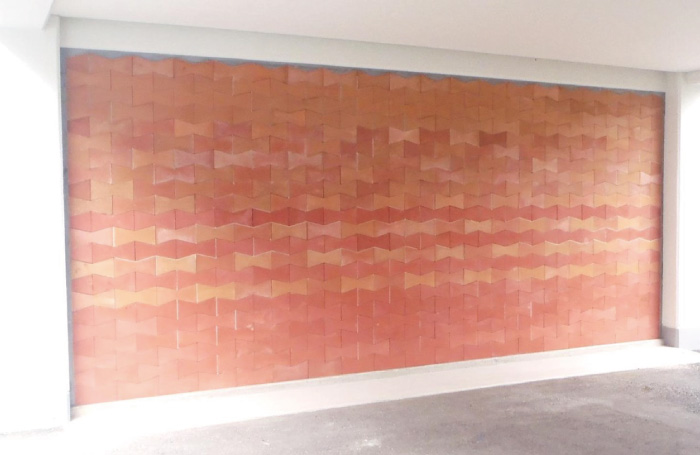
People's awareness of reinforcement against earthquakes has increased in recent years, and needs have become diverse. Particularly for hotels and hospitals, which are used by an unspecified number of people at all times, it is difficult to stop building functions. Hence, there is a strong demand for seismic retrofitting methods that can be applied while a building is in use.
In response, we have developed the ESTONE Block Construction Method, whereby butterfly-shaped concrete blocks are laminated with epoxy resin and gaps between the existing building frame are filled with high-strength grout.

“Butterfly-shaped blocks”
When horizontal forces such as those caused by earthquakes act on conventional rectangular concrete blocks, the force needs to be transmitted using reinforcing bars installed inside the blocks. The process of installing these rebars into the existing frame generates noise and vibrations.
In this method, concrete blocks are shaped like butterflies so that they are interlocked with each other and they transmit horizontal forces efficiently without the need for reinforcement. Therefore, only a minimum amount of longitudinal reinforcement is required to prevent tipping over, and anchor work can be reduced to one-fifth of the usual amount.
-

Horizontal force transmission with ordinary blocks -

Horizontal force transmission with butterfly blocks
Accreditation by a third-party evaluation organization
Putting this method to into practical use, its performance has been confirmed through various structural tests. A series of research results were compiled, and in 2014 Japan ERI Structural Performance evaluation (ERI-K13012) was obtained for the "Takenaka Seismic Wall Construction Method."
Seismic retrofiting while a building is in use
This method only requires the delivery and stacking of concrete blocks by hand, making construction possible even in narrow spaces. In addition, multiple variations are available to meet diverse needs.

Case Study




